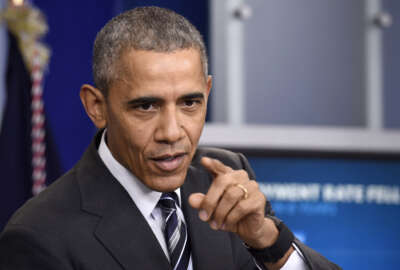
2017 budget breakdown
Here's a breakdown of major agencies and the proposed funding amounts for fiscal 2017, which are included the President Obama's $1.1 trillion budget.
Urging Congress to step up to the challenges of cyber and national security, and embrace the work to be done to address climate change, (federal) customer service and a cure for cancer, President Barack Obama on Feb. 9 released his sweeping $4.1 trillion budget plan.
“My budget makes critical investments while adhering to the bipartisan budget agreement I signed into law last fall, and it lifts sequestration in future years so that we continue to invest in our economic future and our national security,” Obama said in a message included in the budget. “It also drives down deficits and maintains our fiscal progress through smart savings from health care, immigration and tax reforms. And it focuses on meeting our greatest challenges not only for the year ahead, but for decades to come.”
While the top-line number for discretionary spending is not a surprise — Obama signed a bipartisan, biennial budget deal in November — the nearly 200-page document offers a look at where the administration’s priorities are as it heads into its final 10 months.
OMB Director Shaun Donovan said during a press conference Tuesday that in an administration’s final budget, you can see a plan that “trims its sails and dials back on ambition,” or a budget that is “solely a vision document with little that’s relevant to the debate.”
“This budget falls in neither of those camps,” Donovan said. “The budget offers a range of proposals where there’s bipartisan support for taking action.”
But the last spending bill of the administration was not released unscathed.
For the first time in the history of the the Senate and House budget committees, no hearings are scheduled to consider the President’s budget.
“Nothing in the President’s prior budgets … has shown that the Obama administration has any real interest in actually solving our fiscal challenges,” said House Budget Chair Tom Price (R-Ga.), according to the Associated Press.
Here’s a breakdown of major agencies and the proposed funding amounts for fiscal 2017:
Agriculture |
||
| Proposed 2017 Funding | Change to FY16 enacted budget | Highlights/details |
| $23.4 billion | ($1.8 billion) |
Includes $106 million for funding and education for biobased energy sources that range from sustainable and economic forest systems and farm products, to increased production of biofuels $15 million in funding for research on safe water conservation $700 million for the Agriculture and Food Research Initiative, which addresses safe water supplies for farming, response to climate change, soil health and improving food safety and quality Nearly $1.2 billion for the Agricultural Research Service, which includes programs to address climate change, foreign animal diseases and pollinator health
|
Commerce |
||
| Proposed 2017 Funding | Change to FY16 enacted budget | Highlights/details |
| $9.7 billion | $3 million |
$250 million to create and sustain five manufacturing innovation institutes (building on the seven already awarded) to develop technologies and capabilities to be used by U.S.-based manufacturers. The institutes are a combination of companies, universities, community colleges and government. $1.9 billion to build out remaining 27 institutes to create national network. Under the new Workforce Data Science and Innovation Fund, it would partner with the Department of Labor to develop new open source data on jobs and skills to create new ways to help match workers with jobs |
Defense |
||
| Proposed 2017 Funding | Change to FY16 enacted budget | Highlights/details |
| $523.9 billion | $2.2 billion |
More than $11 billion to fight terrorism and provide training and equipment to ground forces fighting the Islamic State militants. $3.4 billion for the DoD’s European Reassurance Initiative, which provides increased military exercises and training to maintain a larger presence in Europe, enhance U.S. preparedness to reinforce NATO allies. $71.8 billion for research, development, testing and evaluation |
Education |
||
| Proposed 2017 Funding | Change to FY16 enacted budget | Highlights/details |
| $69.4 billion | $1.1 billion |
$24.4 billion to support the Every Student Succeeds Act, which aims to reform education through reduction in unnecessary testing and expansion of access to preschool. $907 million for early intervention and preschool services for children with disabilities $450 million increase for Title I, which supports schools in low-income communities Launch of the College Scorecard, which gives students, parents and advisers the most reliable national data to help with college choice $75 million for the American Technical Training Fund, which expands tuition-free job training programs in fields such as manufacturing, health care and IT |
Energy |
||
| Proposed 2017 Funding | Change to FY16 enacted budget | Highlights/details |
| $30.2 billion | $600 million | $2 billion for research and development on energy efficiency and renewable energy
$25 million toward the launch of a new Energy-Water Desalination Hub that aims to reduce cost, energy input and carbon emission levels of stripping salt out of water $150 million in mandatory funding for Advanced Research Projects Agency-Energy (ARPA-E) |
Environmental Protection Agency |
||
| Proposed 2017 Funding | Change to FY16 enacted budget | Highlights/details |
| $8.3 billion | $2 million | $1 billion per year to increase research and development in clean fuels and transportation technologies (working with Energy and NASA)
$13 million for water quality research and support grants |
Health and Human Services |
||
| Proposed 2017 Funding | Change to FY16 enacted budget | Highlights/details |
| $77.9 billion | ($6.7 billion) | $9.6 billion for the Head Start program, which provides early childhood services for “America’s neediest children”
$40 million to support youth-focused behavioral and mental health services $500 million to continue efforts between HHS and DoJ to expand prescription drug overdose prevention strategies $1 billion national “Moonshot” initiative to kill cancer |
Homeland Security |
||
| Proposed 2017 Funding | Change to FY16 enacted budget | Highlights/details |
| $40.6 billion | ($500 million) |
$50 million specifically for efforts to prevent and prepare against violent extremism $275 million for the Continuous Diagnostic and Mitigation program, which has a long-term goal of helping civilian agencies manage cybersecurity risks $471 million to continue the National Cybersecurity Protection System (EINSTEIN) $37 million to expand standing teams of cybersecurity experts ready to help federal agencies |
Housing and Urban Development |
||
| Proposed 2017 Funding | Change to FY16 enacted budget | Highlights/details |
| $38 billion | $500 million |
$128 million for Promise Neighborhoods and $200 million for Choice Neighborhoods, to improve “distressed communities” $15 million for a new program that would help families who rely on HUD support to move and stay in higher-opportunity living areas $20.9 billion for the Housing Choice Voucher program, which provides rental assistance to extremely low- to very low-income households
|
Interior |
||
| Proposed 2017 Funding | Change to FY16 enacted budget | Highlights/details |
| $12.9 billion | ($300 million) |
$1 billion to redesign and reform the Bureau of Indian Education, including $138 million for facilities and $25 million to extend broadband Internet and computer access $98.6 million for the WaterSMART program, which promotes water conservation initiatives $13 million for the National Wildlife Refuge Fund |
Justice |
||
| Proposed 2017 Funding | Change to FY16 enacted budget | Highlights/details |
| $18.1 billion | ($10.6 billion) |
$5 billion ($500 million per year over 10 years) for the 21st Century Justice Initiative, which aims to reduce crime, build community trust and reverse practices that lead to unnecessarily long sentences or unnecessary incarceration $97 million for training and oversight for local law enforcement on the use of body-worn cameras and promote community and law enforcement engagement $4 million for research toward understanding violent extremism |
Labor |
||
| Proposed 2017 Funding | Change to FY16 enacted budget | Highlights/details |
| $12.8 billion | $600 million |
$3 billion for the Workforce Innovation and Opportunity Act $6.5 million to a handful of states to pilot State-based 401(k)-type programs or automatic enrollment IRAs $1.9 billion to ensure worker protection agencies can meet their responsibilities to serve American workers |
Social Security Administration |
||
| Proposed 2017 Funding | Change to FY16 enacted budget | Highlights/details |
| $9.6 billion | $300 million |
New services to the “my Social Security” portal including click-to-chat, secure messaging and online Social Security replacement cards |
State and USAID |
||
| Proposed 2017 Funding | Change to FY16 to enacted budget | Highlights/details |
| $37.8 billion | ($100 million) |
$4 billion to help the people and communities impacted by the fight against the Islamic State militants overseas Provides support for Ukraine and surrounding countries in Europe to help fight Russian aggression Addresses continued and growing demand for passports and visas |
Transportation |
||
| Proposed 2017 Funding | Change to FY16 to enacted budget | Highlights/details |
| $12.6 billion | ($2.3 billion) |
$320 billion ($32 billion per year over 10 years) multi-agency 21st Century Clean Transportation Plan Investing an average of $7 billion per year toward incorporating advanced rail technologies Providing an average of $1 billion per year toward a multi-modal freight program to improve exports and trade |
Treasury |
||
| Proposed 2017 Funding | Change to FY16 to enacted budget | Highlights/details |
| $12.6 billion | $0 |
$100 million for the Financial Innovation for Working Families Fund, which helps low- to moderate-income workers build up rainy day funds Continue work with OMB to implement USAspending.gov data standards Partnership between U.S. Digital Service and the IRS to lay the groundwork for secure taxpayer access to all IRS digital services $100 million to improve IRS services to taxpayers, including modernization of public-facing IT infrastructure |
Veterans Affairs |
||
| Proposed 2017 Funding | Change to FY16 to enacted budget | Highlights/details |
| $75.1 billion | $3.5 billion |
$65.1 billion for health care Portion of $190 million for in-person re-employment services, including returning veterans Share of $11 billion in housing vouchers, which would help address homeless veterans |
Copyright © 2024 Federal News Network. All rights reserved. This website is not intended for users located within the European Economic Area.
Michael O’Connell is senior digital editor of Federal News Network optimizing content for the best user experience. Follow @moconnellWFED
Follow @moconnellWFED





